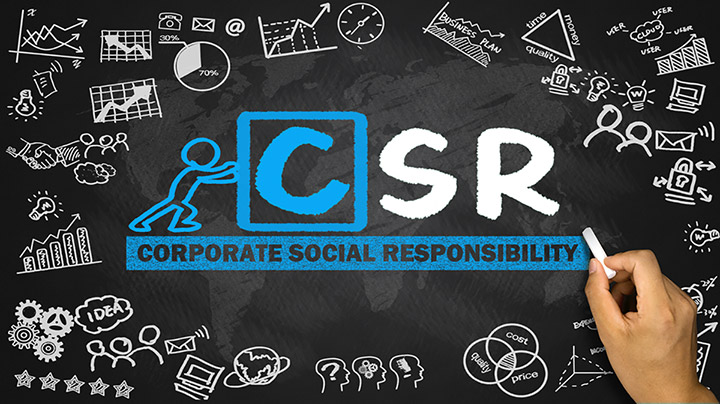
03 May Why Companies should invest in Corporate Social Responsibility
What is Corporate Social Responsibility and his origins?
The European Commission has defined the Corporate Social Responsibility as “the voluntary integration of social and environmental concerns of the company in their business operations and with their relationships with the interested parties”. Later the EC, editing their strategy for 2011-14, has modified the original definition of CSR with “the responsibility of companies for their impact on the society”.
The CSR, in Italy as known as RSI (Responsabilità Sociale d’Impresa), is considered by the European Union, from the 2000, one of the strategic tools that can be used to increase the competitiveness and the presence of a company on a social level. It does not consist only in respecting the law, but also involves all the actions and behaviours that a company starts to obtain advantages and benefits for itself and for his context.
The relationships between the different stakeholders are fundamental, such as: suppliers, workers, partners, local community and institutions. In fact the CSR actions are a combination of business objectives and social and environmental objectives, with reference to the context in which the company works.
CSR in the World
The CSR concept has more value in Europe than in the rest of the world , even if the phenomenon started in the USA with the inclusion of this concept in USA business language.
In fact all the “green” movement has been felt more in Europe, that means that companies are more sensitive to CSR. However in the last few years there has been a “leveling off” of the USA law, recognizing that the companies need to be responsible for their actions, making up for their delay. In other continents like Asia and Latin America have been late for a long time, even if they have acknowledged the social responsibility of the companies.
CSR. However in the last few years there has been a “leveling off” of the USA law, recognizing that the companies need to be responsible for their actions, making up for their delay. In other continents like Asia and Latin America have been late for a long time, even if they have acknowledged the social responsibility of the companies.
In addition, worldwide, the United Nations had an important role promoting the CSR idea with the “Global Impact” campaign, that various countries had signed. This pact binds the signatories to accept principles of social responsibility that each company in these countries has to follow and implement.
CSR in Italy
 Corporate Social Responsibility phenomenon is growing faster in Italy and there is a different commitment from a sector to another. The most active sectors are: chemicals, mechanical and automotive, financial, electronics/computer/telecommunications. The impact of the commitment is higher among companies listed in Stock Exchange.
Corporate Social Responsibility phenomenon is growing faster in Italy and there is a different commitment from a sector to another. The most active sectors are: chemicals, mechanical and automotive, financial, electronics/computer/telecommunications. The impact of the commitment is higher among companies listed in Stock Exchange.
CSR is an opportunity for companies, not an obligation. As a matter of fact, for now, it is not included as a duty in law and there are not special requirements to use this program. Although a lot of PMI (small/medium companies) unknowingly perform CSR activities. This type of companies takes advantage of their features because they have a flexible nature that makes them capable of adapting and developing new products and processes quickly, taking behaviors in line with CSR. In addition, small companies are skilled in managing relations with the local community, since themselves represent an integral and visible part of the community in which they operate.
The Social Responsibility of the Territory
In the last period a new declination of social responsibility was born, not only referred to the single company, but to the whole community. This declination is particularly addressed for the Italian reality due to the territorial composition (Small-medium enterprises, basically grouped in industrial districts connected in a reticular form).
The Corporate Social Responsibility strategy to stimulate companies to take responsible behavior is now set in a new context, where the promoter is the whole community, the whole territory in which the various stakeholders live and work.
The transition from a “single and / or individual responsibility” to a “collective responsibility” has the objective of accompanying institutions and organizations (public and private; profit and non-profit) in a shared construction path where the right economic demands must be combined with social and environmental considerations in the perspective of sustainable development.
The Reasons Why
Why an entrepreneur should become socially responsible if these activities in major cases involve additional costs? First of all because CSR gives immediate benefits to the corporate image, also improving corporate reputation with benefits also in business relationships, with new business opportunities. Clients and suppliers prefer to deal with an entrepreneur that invests money and time in responsible projects, that intervenes supporting the local community or that respects the environment. These makes clients and suppliers more loyal.
The coherent use of CSR establishes an essential contribute to sustainable developing and crossing social challenges and can make a positive influence on his own business competitiveness. In addition, CSR can also facilitate relations with local communities and public administrations.
CSR Topics
The Corporate Social Responsibility embrace a various amount of topics that the corporate management have to keep in mind. Between these there are work conditions (including health protection), human rights, environmental protection, corruption prevention, fair competition, consumer interests, taxation and transparency. To implement CSR, it is necessary to take into consideration the interests of stakeholders (shareholders, workers, consumers, local communities, non-governmental organizations, etc.), to comply with regulations and agreements with social partners. A company must also consider social expectations, which can go well beyond legal obligations.
The more or less ethical behavior of a company does not only concern the stakeholders, it also interests citizens that are not satisfied only with abstract declarations: they require a constant and credible commitment, the result of a precise managerial policy and a company system organized for this purpose.
Concretely the Corporate Social Responsibility can be shown with different actions:
– financing of training courses
– granting of employee benefits
– sponsorship or implementation of social and / or cultural projects on its territory or in areas that may be disadvantaged
– promotion of initiatives to defend the environment
The employees are an important part of Corporate Social Responsibility, in fact it is necessary to adopt policies, like training courses and benefits, to satisfy their needs in order to increase their motivation, and so efficiency and profitability. It is not always true that CSR is a cost: for example, in energy optimization with waste minimization and reuse, which lead to the reduction of waste and therefore to economies of scale useful to have costs reduction.
CSR in choosing products and services
In these years consumers, choosing a product, consider not only his features, but his value is also made up of immaterial characteristics: supply conditions, assistance and customization services, image and finally the history of the product itself.
Producers and consumers are aware of the centrality of these aspects in competitive dynamics and the “historical trace-ability” of the production chain that led to the creation of the product is currently gaining market attention.
It is therefore unquestionable how the “ethical” commitment of a company enters directly into the value chain of its production, determining competitive processes and levers consistent with a “sustainable development” for the community.
Corporate Social Reputation 2.0 – Social Network
In this era Social Networks and Blogs are instrument of communication such as traditional actions.
They are useful tool for the company to convey public opinion for the benefit of its image on the market.
Speaking of internal Social Networks in the company means having understood the vast range of implications linked to the use of Communication 2.0, considering its innumerable potentialities, not least those aimed at consolidating vertical and traversal interactions with other companies but above all with users / consumers / customers.
In fact, companies are interested in this phenomenon, obviously with the intent of “doing business” or, at least, of trying a sort of control over the information that ends up on the Internet.
The flow of information on the Net through the various channels is in fact not controllable and cannot be managed. This sort of corporate impotence therefore becomes a problem of no small importance: intervening at games made, to sanction or block those who have entered a negative comment, can even provoke more devastating effects.
Why TeamWorking?
TeamWorking aims to create a collaborative and peaceful working place through Team Building activities. These projects are customized for your company with the objective of gaining feeling of belonging and, at the same time, doing something good for the environment and for who needs help.
There are different typed of Social Team Building, here some examples:
– for helping those in needs we have organized Social Cooking activities and Social Constructions;
–for becoming aware of environmental concerns we can organize Team Building activities where your colleagues reuse materials, making the world a better place while they have fun! For example the Crazy Car Race in which the participants use materials, that should be cleared out, to create a minicar with a final race between the different teams;
–for helping the environment with specific activities, for example the creation of vertical garden for a kindergarten, making possible for kids to have a first approach with nature.
Make the world a better place and do something good for who is in needs with TeamWorking!



Sorry, the comment form is closed at this time.